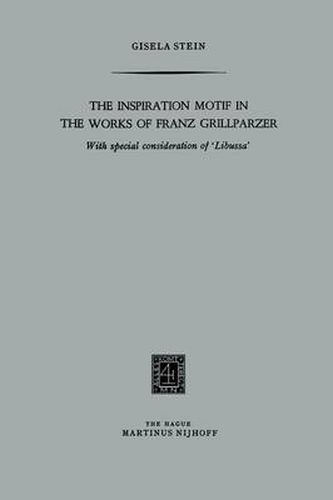Readings Newsletter
Become a Readings Member to make your shopping experience even easier.
Sign in or sign up for free!
You’re not far away from qualifying for FREE standard shipping within Australia
You’ve qualified for FREE standard shipping within Australia
The cart is loading…






This title is printed to order. This book may have been self-published. If so, we cannot guarantee the quality of the content. In the main most books will have gone through the editing process however some may not. We therefore suggest that you be aware of this before ordering this book. If in doubt check either the author or publisher’s details as we are unable to accept any returns unless they are faulty. Please contact us if you have any questions.
Franz Grillparzer was not a man of extravagance either in phrase or conduct. His life as an individual and artist is marked by a reticence, an aversion to the unveiling of the inner SOul,1 that is perhaps best matched by the concise style and expression of his works. This art of effective restraint is particularly visible in the dramas where often a single word or indeed an utter silence carries the greatest emotional impact. There is an absolute lack of sound and fury signifying nothing; even in the frenzy of inspiration 2 Grillparzer carefully chooses words that best convey his thoughts and for purely emotional release he turns to another medium which he sharply distinguished from poetry: to music. If this poet then who knows no empty phrases applies terms like ‘betrothed of the gods’,3 ‘mother of all greatness’,4 ‘mighty 5 lever of the universe’, ‘messenger of divine happiness'6 to one and the same concept at different times, we may assume that he here expresses something deeply anchored in his being. And indeed, the motif of concentration ('Sammlung’) and inspiration (‘Begeisterung’) is one that we meet again and again in the poetry, the diaries and the dramas. This emotional state is at all times highly revered and greatly sought by the poet - it is, in fact, made a condition of creative productivity and, as the years pass, finally develops into a condition of life itself in the prophecy of ‘Libussa’.
$9.00 standard shipping within Australia
FREE standard shipping within Australia for orders over $100.00
Express & International shipping calculated at checkout
This title is printed to order. This book may have been self-published. If so, we cannot guarantee the quality of the content. In the main most books will have gone through the editing process however some may not. We therefore suggest that you be aware of this before ordering this book. If in doubt check either the author or publisher’s details as we are unable to accept any returns unless they are faulty. Please contact us if you have any questions.
Franz Grillparzer was not a man of extravagance either in phrase or conduct. His life as an individual and artist is marked by a reticence, an aversion to the unveiling of the inner SOul,1 that is perhaps best matched by the concise style and expression of his works. This art of effective restraint is particularly visible in the dramas where often a single word or indeed an utter silence carries the greatest emotional impact. There is an absolute lack of sound and fury signifying nothing; even in the frenzy of inspiration 2 Grillparzer carefully chooses words that best convey his thoughts and for purely emotional release he turns to another medium which he sharply distinguished from poetry: to music. If this poet then who knows no empty phrases applies terms like ‘betrothed of the gods’,3 ‘mother of all greatness’,4 ‘mighty 5 lever of the universe’, ‘messenger of divine happiness'6 to one and the same concept at different times, we may assume that he here expresses something deeply anchored in his being. And indeed, the motif of concentration ('Sammlung’) and inspiration (‘Begeisterung’) is one that we meet again and again in the poetry, the diaries and the dramas. This emotional state is at all times highly revered and greatly sought by the poet - it is, in fact, made a condition of creative productivity and, as the years pass, finally develops into a condition of life itself in the prophecy of ‘Libussa’.